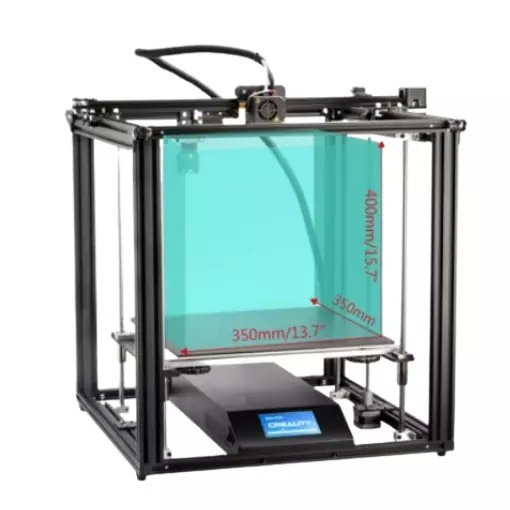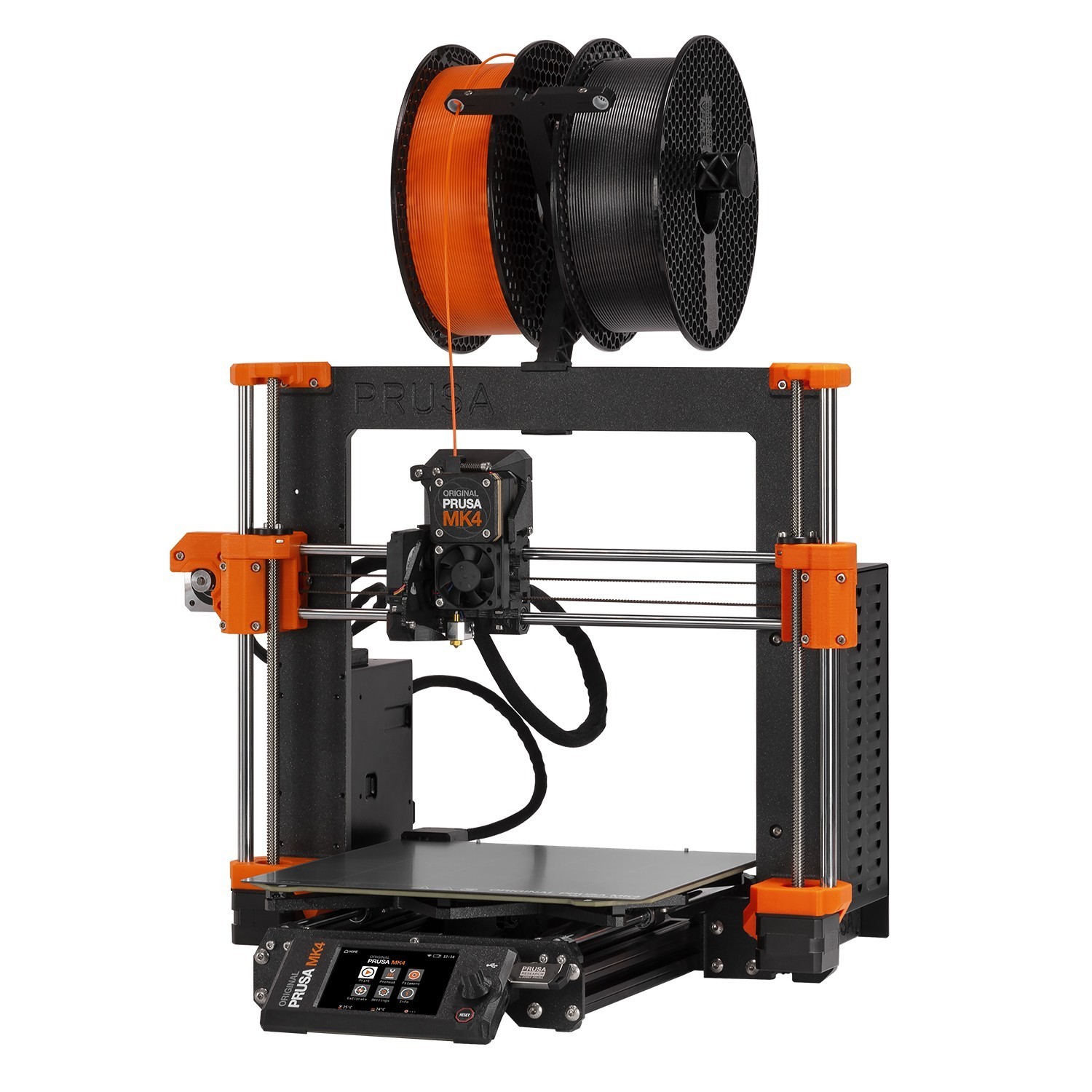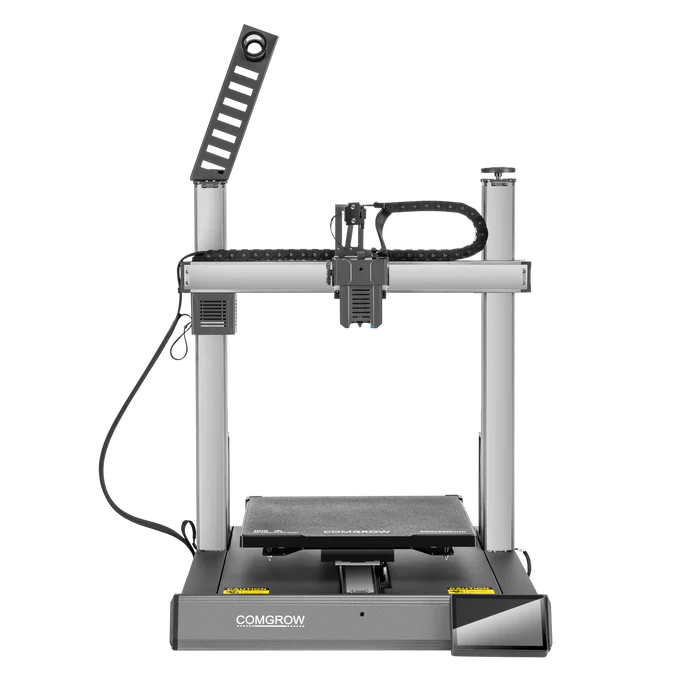Compare Ender 5 Plus vs Original Prusa MK4 3D Printer vs Comgrow T300
Comparison between the best 3D printers
Choose the best 3D printer at the best price. The cheapest 3D printers are here.
Buy a 3D printer here with 3D Fila.
 |
 |
 |
|
| Model | Ender 5 Plus[BUY Ender 5 Plus] |
Original Prusa MK4 3D Printer[BUY Original Prusa MK4 3D Printer] |
Comgrow T300 |
| Printing Material | Filament | Filament | Filament |
| Estimated price | $599,00 | $1099,00 | $449,00 |
| Fabricante | Creality 3D | Prusa | Sovol |
| Release Year | 2019 | 2023 | 2024 |
| Print Volume [mm] | 350x350x400 | 250x220x210 | 300x300x350 |
| Printer Size [mm] | 632x619x666 | 500x400x550 | 503x631x831 |
| Weight [kg] | 18,2 | 7 | 17 |
| Power Loss Recovery | YES | YES | YES |
| Enclosed printer | NO | NO | NO |
| Bed Leveling | Automatic | Automatic | Automatic |
| Filament End Sensor | YES | YES | YES |
| Bed type | Heated | Heated | Heated |
| Power supply system | Bowden | Direct Drive | Direct Drive |
| Standard nozzle | 0,4 | 0,4 | 0,4 |
| Maximum Nozzle Temperature [°C] | 260 | 300 | 300 |
| Maximum Bed Temperature [°C] | 100 | 120 | 100 |
| Maximum printing speed [mm/s] | 180 | 180 | 600 |
| Filament holder | YES | YES | YES |
| Camera for supervision | NO | NO | NO |
| Recommended filaments | PLA, TPU, ABS, PETG | PLA, ABS, PETG, PC, Nylon, Tritan, PP | PLA, PETG, PET, TPU, PA, ASA, PC, PLA CE, PA-CF, PET-CF |
| Recommended slicers | Cura, Simplify, Slic3r | Cura, Simplify, Slic3r, IdeaMaker, PrusaSlicer e outros | Bambu Studio, Super Slicer, Cura, Prusa Slicer, Orca Slicer |
| Maximum Resolution [mm] | 0,1 | 0,1 | 0,1 |
| Processor | 32 bits | Custom 32-bit xBuddy electronics with STM32 | 64 bit |
| Display | Touchscreen TFT 4,3'' | Display touchscreen 3,5'' | Touchscreen 5'' |
| Power Supply | 24V / 504W | 240 W | 150 W |
| Connectivity | SD / USB | USB / Wi-Fi / internet via Prusa Connect | USB, WiFi |
| Operating systems | Windows, Mac, Linux | Windows, Mac, Linux | Windows, Linux, Macbook |
| Date of registration in the system | 2021-04-14 | 2023-06-06 | 2024-05-10 |
| Release date | 2019 | 2023 | 2024 |
| Extra features | The Ender 5 Plus offers a large print volume (350x350x400 mm) and fast assembly. It includes a BLTouch sensor, but with range limitations. It stands out for its dimensional accuracy, although it requires adjustments to the slicer settings. Despite the noise, its integrated design saves space, and includes features such as a filament sensor and power resumption. Ideal for large projects, it requires refinement in the settings for high-quality prints. | The Original Prusa MK4 stands out with automatic first-layer calibration via Loadcell sensor, high-speed enabled by Input Shaper and Nextruder for precise prints. It includes quick-change nozzles, customizable UI, and Ethernet/Wi-Fi connectivity. It supports a wide range of materials, from PLA to flexibles. Equipped with a 32-bit xBuddy mainboard and precise stepper motors, it offers exceptional print quality, enhanced security, and remote printing options via Prusa Connect. | The Sovol Comgrow T300 printer stands out for its technological innovations and advanced features. With a print size of 300mm300mm350mm, the T300 offers true linear rails on all axes, ensuring greater stability. Its Klipper-based intelligent core and 64-bit microcomputer increase printing speed and quality through pressure advancement and input shaping. The extruder with a gear ratio of 6.5:1 allows for more precise material control, optimizing the printing of flexible materials. In addition, the T300 features a rapid filament cooling system with a high-speed fan and a circular duct piece that improves cooling efficiency. With a 4.3-inch high-refresh rate touchscreen and an 81-point automatic leveling system, the T300 simplifies the preparation and execution of 3D prints. |
| Support for multiple colors and materials (AMS and CFS) | NO | NO | NO |
Notes * |
|||
| Cost-benefit | 6 / 10 | 6 / 10 | 8 / 10 |
| Hardware | 2 / 10 | 3.2 / 10 | 3.6 / 10 |
| Screen | . | . | . |
| Print volume | 4 / 10 | 3 / 10 | 4 / 10 |
| Performance | 1 / 10 | 1 / 10 | 5 / 10 |
| [BUY Ender 5 Plus] | [BUY Original Prusa MK4 3D Printer] |
Conclusion |
| In comparing the three 3D printers—the Ender 5 Plus, Original Prusa MK4, and Comgrow T300—each model offers unique advantages and is tailored to different user needs. The **Ender 5 Plus** presents a good balance between print volume and price, making it a solid choice for those looking to handle larger projects without exceeding a moderate budget. While it features automatic bed leveling and a filament sensor, users should be prepared to make adjustments to slicer settings for optimal results. Its dimensional accuracy is commendable, but the noise level might be a consideration for some users. On the other hand, the **Original Prusa MK4** offers advanced features and exceptional print quality, which justifies its higher price point. With capabilities like automatic first-layer calibration, fast printing speeds, and support for a wide range of materials, it is ideal for those who seek top-tier performance and versatility in their 3D printing endeavors. Additionally, its connectivity options and user-friendly interface enhance its appeal for experienced and ambitious users alike. The **Comgrow T300** stands out for its innovative features and impressive printing speed, which is especially beneficial for those working with flexible materials. With true linear rails for stability and a Klipper-based intelligent core, it combines performance with ease of use through its advanced leveling system and high-refresh touchscreen. Its cost-effectiveness is particularly appealing for budget-conscious users seeking high-quality prints. In conclusion, the best choice among these printers largely depends on the user’s specific requirements and budget. For a balance between cost and capability, the Ender 5 Plus is a practical option. For those prioritizing print quality and advanced features, the Original Prusa MK4 is unmatched, while the Comgrow T300 offers innovative solutions at a competitive price, catering well to speed-focused users. Ultimately, each model provides a compelling case, ensuring there is a suitable option for a wide range of 3D printing enthusiasts. |

